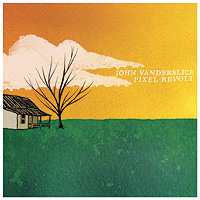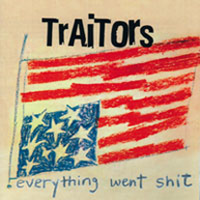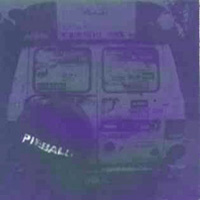 John Vanderslice
John Vanderslice
Pixel Revolt (Barsuk)
By Tim Den
First things first: I’m a big fan of John Vanderslice. I loved his last full-length, Cellar Door, and have struck up a friendship with him over the past few years. I think his loyalty to analog engineering has not only made him one of the last truly knowledgeable producers around, but also given his own creative efforts an intimate, organic touch that no digital recording can duplicate. Above all, though, I think he writes some clever melodies that more people would love, if people were half as clever as his songs.
So why, then, am I not able to embrace Pixel Revolt whole-heartedly? The album opens strongly enough, with “Letter to the East Coast,” “Plymouth Rock,” and “Exodus Damage” all weaving narrative and structural tales like a wise village elder. There are moments of suspense, subtlety, resolution, and – especially in the case of “Exodus Damage”‘s drum treatment – superb sound handling, but wait: Where do all these elements go when “Peacocks in the Video Rain” arrives? Semi-irritating vocal phrasing and repeating-for-repeating sake ruin the momentum, as descriptions such as “sequined eight year-old cowboy” throw wrenches into the lyrical flow. What gives?
A few songs later, it dawns on me: The bio – and indeed, much of the press’ hoopla over Vanderslice’s “lyrical” quality since Cellar Door‘s success – has made me expect too much. According to everyone under the sun, Vanderslice is supposed to be an author as apt at sculpting sonic preciousness as he is at penning stories. “Reminiscent of top-tier fiction writers,” the bio boldly claims. Okay… where? In the murky metaphors of “Trance Manual?” I don’t think so. For a song that’s supposed to symbolize a soldier’s conflicted – and maybe fabricated – visit to an Iraqi whore, there are absolutely no hints of theme, resolution, or purpose. Hell, if the “Guide to Pixel Revolt” (came with the bio) hadn’t clearly stated the meaning of the song for me, I would’ve never been able to figure out its intentions through lines such as “come to me now/the kind that comes with/sandbags along the river” and “wear your mirabilis/dotted on your pulse points/a miraculous transformation/ahh my aching joints.” Vanderslice seems to be focusing on all the wrong details, squeezing in a word like “mirabilis” simply for the sake of melodic flow. Indeed, many times throughout Pixel Revolt, Vanderslice seems to either elongate or multi-syllablize unnecessarily, forcing his words to cooperate with measures and meters, resulting in numerous lines annoying the hell out of you like that kid in class who was always trying to quote Bad Religion nouns.
But I digress. The issue remains that, if you want to tell a story (however meticulously lined with symbolism and “literary” witticism), you have to know what to reveal and what to keep hidden. The Divine Comedy, Tom Waits, early Tori Amos: All masters of the craft. “Angela”‘s bizarre “bunny gone lose… let’s buy land in the middle of nowhere” nonsense? Yyyyyeah not so much. Even if Vanderslice’s goal was to create a nonsequitor song, what would make him write “he was eating spring mix on the carpet/he jumped through a window into the haze” and decide that the second line alone wasn’t enough to deliver the message? Was spring mix (and specifically spring mix) that integral to the whole thought? And don’t even get me started on “Continuation,” a supposed murder mystery. The premise takes way too long to set up, meaningless details are again mentioned (detectives Rieger, Thomson, and Foley [wait… is that a Beverly Hills Cop reference!?] are murder suspects, but the latter don’t fit the profile… ah ha, you were expecting a twist at the end against that assumption, right? Nope, none given), and there is absolutely no ending. The cops get suspicious of each other, and… next song. So I just sat threw the worst, most lifeless riff – repeated ad nauseam – for nothing!?
Thankfully, Pixel Revolt contains one of Vanderslice’s best songs ever, making it worth the trudge through the mire. “Dear Sarah Shu,” a gentle warning to the narrator’s successor (to what, it doesn’t elaborate), is able to express the song’s essence in one simple, gorgeously melodious line: “in the end, it is love you’ll have to learn to survive.” So simple, yet worth a thousand words. Why couldn’t the entire album be like this?
Cellar Door succeeded partly because the music was great, partly because the songs’ subject matter were based on films (with fully-rendered story arcs and so on). Even if Vanderslice’s interpretations were at times convoluted, the listener’s familiarity with the films could serve as a guiding light. On Pixel Revolt, however, there is no similar crutch. Perhaps that’s why the publicist included a song-by-song explanation with the bio?
Don’t believe the hype: Though John Vanderslice is better than a lot of garbage that’s out there today, the man is not the ingenious poet he’s made out to be. And even though certain songs on Pixel Revolt hint at that status one day in the future, for now, my extremely affable, good-natured acquaintance first has to figure out what to say, what not to say, and how not to keep repeating one riff until the audience is blue in the face.
(www.barsuk.com)



